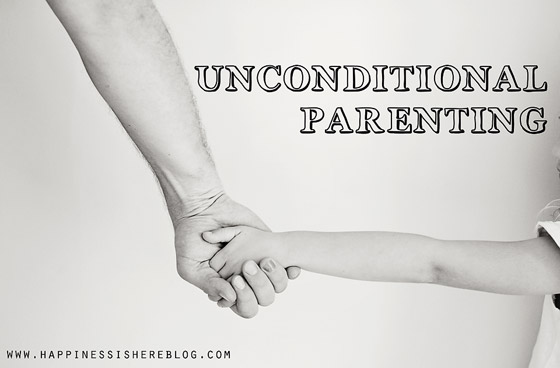
Unconditional Parenting
This post is part of the 30 Days Towards Connected Parenting series.

We all want our children to know they are loved unconditionally right? We feel that we love them unconditionally. No matter what. So we should strive to make sure our actions also convey this message. It’s one thing to think it yourself, but it’s more important that your kids feel it from you.
Unfortunately some popular parenting techniques don’t convey our feelings. Punishment, and even rewards give children the message that they must earn our love by pleasing us, and acting how we want them to act. I don’t think anyone purposely chooses to send their children this message, or at least I hope not. But often we just don’t think. If that was the way you were parented, and your parents were parented, and the way your friends parent, then you assume this is what must be done and it’s hard to see another way. But the way towards more connected parenting is considering these things. Considering our assumptions, expectations, and actions. What messages are we sending our children?

Punishment/Shame
This is probably the easiest for people to recognise. When you punish a child you tell them that their actions are not acceptable to you. You also risk sending the message that they are not acceptable to you. The research is clear by now. Punishment doesn’t work. That’s why you have to keep doing it. It also takes the focus away from learning from mistakes, to avoiding punishment in the future. We want to teach our children to do the right thing not because they fear arbitrary punishments, but because they are motivated to do the right thing because of their own ethics. Punishment robs them of this chance. It also damages connection, therefore nullifying the biggest influence you have on your children. There has been lots written on this topic before. Whether you believe it or not, punishment is detrimental. It’s time to move on from punishing, smacking, shaming, yelling, and time outs. Let’s move towards working together, treating our children like people, respect, support, and unconditional love.
Rewards/Praise/Bribes
It’s harder for people to believe that rewards and praise, like punishment, can also be damaging. At least it was for me. But really they are two sides of the same coin. Even though you feel like you are giving children something ‘good’ when you offer praise, your goal is still the same, to control their behaviour. Again, sending the message ‘I want you to do this to please me’, or ‘when you act like that you are good’. ‘Good girl/boy’ slips out so frequently for people though doesn’t it? It was something that was hard for me to stop doing too. It was so worth it though. Saying ‘good girl’ is not helpful. Children are always ‘good’! Sometimes they make mistakes like anyone else, but that doesn’t mean in those times they are bad. We want children to be internally motivated to behave well and achieve what they want to achieve. When you praise or reward them for something they were motivated to do anyway, you shift the focus onto pleasing you instead. Bribes are obviously not helpful either. We accuse children of being manipulative and yet we teach them how to be by bribing them. Doesn’t make much sense. It’s time for rewards, praise, and bribes to be left out of parenting too!
“When children feel they must keep doing impressive things so their parents will be proud of them, their acceptance of themselves may become equally conditional.” – Alfie Kohn

Children want and need to be loved unconditionally. Let’s show them we feel that with not only our words but our actions. Time to get rid of punishment and rewards.
What can you do instead?
- Use natural consequences instead of arbitrarily imposed punishments.
- Talk about problems and work out solutions together.
- Model the behaviour you want to see in your children.
- Show empathy and understanding while also maintaining boundaries. Offering comfort is not ‘giving in’, it’s helping them learn good emotional regulation.
- Instead of praising: ask questions, describe what you see, or say nothing.
- Respect them as you would an adult.
- When a problem arises, focus first on connection instead of control.






Comments
Thanks for posting this. I’m enjoying this series. It is especially pertinent right now as I transition away from a Jo Frost parenting style towards a Maria Montessori way.
Thank you Betsy!
Ahh. It’s good to have a reminder of how to avoid praising my children. I’ve been practicing this for half a dozen years, and I get to keep practicing it. I often ask my children how they feel about their accomplishments and creations. I’m getting there!
It’s so hard Ammie!! Such an automatic thing sometimes.
I love everything you post and always find myself browsing through your blog when I’m in need of advice. I noticed the link goes along with “Show empathy and understanding while also maintaining boundaries.” Is no longer a site. Do you have any other suggestions of blogs talking on this subject? Specifically for an almost 3 year old would be great :] thanks so much
Oh no!
I’ve written a post on it now 🙂 https://happinessishereblog.com/2016/01/parenting-without-punishment/
Thank you for explaining this so well! I’ll keep trying to be a connected parent.
This is soooo encouraging.